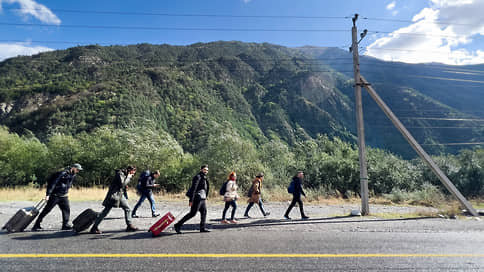The departed citizens were included in the concept – Kommersant
[ad_1]

The problem of the outflow of the population abroad required the intervention of the head of state. Vladimir Putin, by his decree, adjusted the concept of migration policy until 2025, demanding the creation of “attractive financial and social mechanisms” to reduce this trend. The President also called for the creation of “conditions for the return” of residents to new regions that they left due to hostilities in Ukraine. In the latter case, it is necessary to ensure the safety of living and restore housing and social infrastructure, the expert believes.
Amendments to the Concept of the State Migration Policy of the Russian Federation for 2019–2025 were made by Presidential Decree No. 342. Clause 10.2 appeared in the document, which refers to “an increase in the migration outflow of the population abroad” in 2022 “under the influence of changed socio-economic conditions.” “In this regard, additional measures are required to create attractive financial, social and other mechanisms for preserving human capital, reducing the outflow of the population of the Russian Federation abroad,” the decree says. Specific measures do not appear in the text, they are usually described in a government decree adopted in pursuance of the concept.
Exact estimates of the number of citizens who left Russia are unknown. But in December 2022, Alfa-Bank analysts reported (with reference to statistics on the labor market and consumption) that about 1.2 million people left Russia in the third quarter of last year. At the same time, according to the Ministry of Internal Affairs of the Russian Federation, in 2022, 16.8 million documents were issued to foreigners for registration (in 2021 – 13.3 million).
Amendments are also made to paragraph 22 of the concept, which refers to the main directions of migration policy. Thus, from the preamble of this article, “assistance to the voluntary resettlement in the Russian Federation of compatriots living abroad” is removed. A separate subparagraph includes the creation of “conditions for the return” of residents to places of permanent residence in new regions that they left due to hostilities in Ukraine. The decree, in particular, refers to residents of the DPR, LPR, Zaporozhye and Kherson regions. The special military operation itself is also now included in the concept. Its new clause 10.1 states that “due to the direct threat to life and health emanating from the armed forces of Ukraine,” residents of new regions began to arrive in other subjects of the Russian Federation, and the operation itself is carried out “including” in order to protect these residents.
The concept of the state migration policy of the Russian Federation for 2019–2025 was adopted by presidential decree in October 2018. The 35-point document gives a portrait of the previous five-year plan: 10 million foreigners stayed on the territory of the Russian Federation annually, including about 3 million migrant workers (3–4% of the average annual labor force). The migration flow “compensated for the natural population decline and became a source of additional resources for the economy.” Among the main principles of migration policy, the priority of the interests of the Russian Federation and its citizens was mentioned, as well as “taking into account the diversity of regional and ethno-cultural ways of life of the population of the Russian Federation”, among the tasks – improving the legal and organizational mechanisms for the entry and stay of foreigners in the Russian Federation, as well as creating conditions for their adaptation to living conditions in the country.
The head of the Center for Analytical and Practical Research on Migration Processes, Vyacheslav Postavnin, believes that the outflow of the population from the Russian Federation in 2022 was due to SVO and “partial mobilization.” Speaking about measures to reduce such an outflow, Mr. Postavnin mentioned “good educational work”: “So that people understand that military service is their duty.”
“People could probably be brought back by providing them with high-paying jobs. But it is difficult to do this in the current situation,” the expert reasoned, mentioning, for example, young scientists, for whom “there are many more opportunities to join knowledge and high technologies” in Western countries.
As for the conditions for the return of residents of new regions, Mr. Postavnin mentioned the need to ensure the safety of living and restore housing and social infrastructure: “If they don’t bomb and shell, they create jobs, start medicine and schools, people will start returning.”
[ad_2]
Source link








